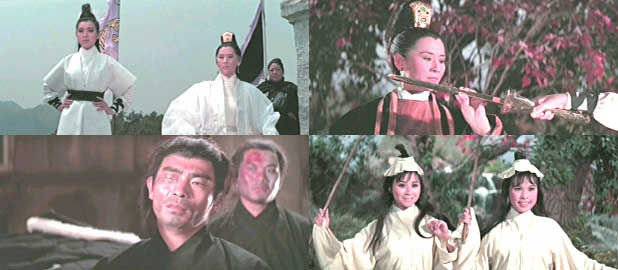The Golden Sword
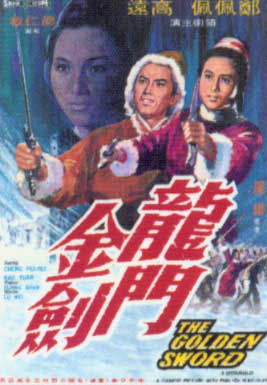
Director: Lo Wei
Year: 1969
Rating: 6.0
In 1969 director
Lo Wei and Cheng Pei-pei teamed up for three wuxia films – the other two
being “Dragon Swamp” and “Raw Courage” - in a collaboration that began during
their years at Shaw and continued after both left the studio (“Shadow Whip”
and “Kung Fu Girl”). Compared to the two other films, “The Golden Sword”
is a bit lackluster with a narrative that feels like a bent edge. Most of
the first half of the film seems to have little in common with the final
half – they are the same characters but it leads you down one road and then
suddenly shifts the nature of the film and it doesn’t really hang together
that well. At the same time there are a number of individual scenes that
are nicely done, but it almost seems like two scripts roughly sewn into one
cloth. Cheng Pei-pei has a few solid scenes – she gets a terrific song and
dance number and a few enjoyable action sequences, but also disappears for
stretches with the focus swinging to her wan male co-star.
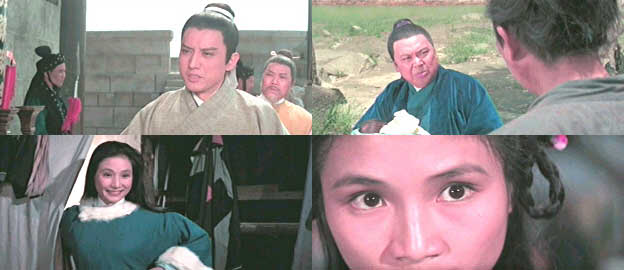
As Snoopy might write, one dark and rainy night two mysteriously hooded
figures appear at the home of kung fu master Bai Chun-tung (Lo Wei) and demand
that he accompanies them. Without hesitation, he joins the pair and they
all disappear into the night – and Bai vanishes for years. Seven years later
his now grown son, Bai Yu-long (Kao Yuen) begins to look for his father in
the territories outside of the rule of law. On his long journey one day he
passes a dirty vagrant walking in a snowstorm on the road and offers a ride
to the nearest town but is turned down. Later this same vagrant shows up
at the inn and Bai again offers his help and asks the person to share his
warm bed. What Bai doesn’t know – but we the much smarter audience do – is
that this vagrant is in fact a woman – played by of course Cheng Pei-pei
– and this causes some mild humor as Ngai does her best not to end up in
bed with him.
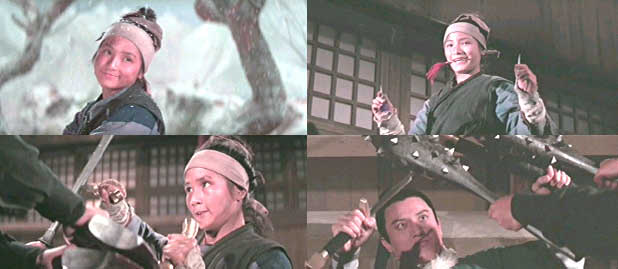
Soon he discovers that not only is she a female but one with astonishing
kung fu powers. This occurs when she meddles in the middle of a fight and
is able to catch three knives flung at her – one in her mouth. The two of
them take on an inn full of hooligans and Ngai announces that she will kill
the Three Cripples in ten moves. Ten movies later she is on her way back to
the camp of beggars – an assortment of Robin Hood types who steal from the
wealthy to feed the poor – and when they are not stealing and fighting they
love a good old hootenanny. Bai is so taken with her singing and kung fu
that he invites her on his quest and the two of them wander the country for
over a year. Then suddenly they are married. End of part one of the film.
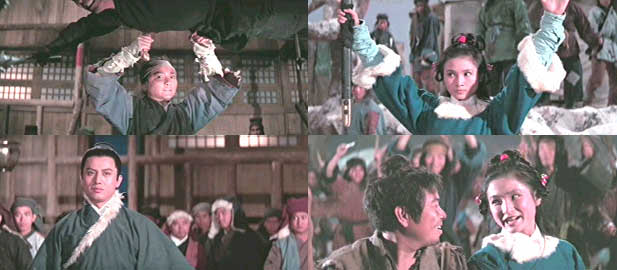
The second section of the film is much more what one expects from a Lo Wei
film with its use of strong females, hidden identities, face masks, confusing
turns and a secret fortress – all pop elements he uses in both his Bond like
films as well as his martial arts ones. On the day after the marriage the
figures in the hoods appear again and demand that Bai come with them – but
he refuses and in the ensuing fight these figures prove to have martial arts
ability much beyond that of Bai and Ngai and he is captured and taken away
to the Dragon Palace.
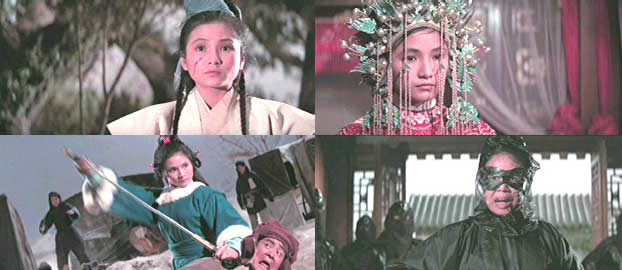
The Dragon Palace is ruled by women – the chief (Wang Lai) and her Second
in Command (Go Bo Shu) show little mercy towards the male species and keep
them enslaved and chained up (and since there are young members of the Dragon
Palace, the men are possibly used for other purposes!). If they attempt to
escape they are thrown into a pit of snakes or shown a video of the Greatest
Speeches of George Bush. Bai is brought here but for a different purpose –
one that brings him face to face again with his long lost father and maybe
his mother. Appearing also are Ku Feng as one of the Three Cripples, Yeung
Chi Hung as the major-domo of the Bai residence and you can spot Sammo as
one of the minions at the inn. Lo Wei often has a lot of good ideas in his
films, but he often stumbles in the execution with his poor pacing and that
is the case here to some extent. Still, any Cheng Pei-pei is better than no
Cheng Pei–pei!
